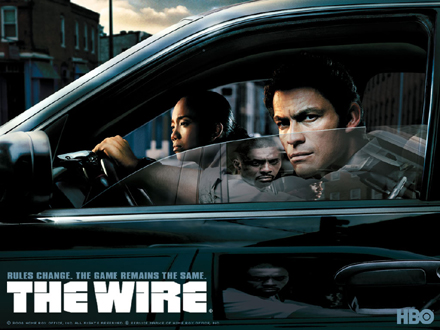|
From the start, it’s
clear that this is not your typical cop show. Weapons are rarely drawn, and car
chases are almost completely absent. As a cable show, sex and swearing are
turned up a notch, so viewer discretion is advised. Most of all, though, what
makes The Wire unique is that it takes its time. Simon, a former reporter
for the Baltimore Sun, has things to say, and he says them with story
arcs that are unhurried and meticulously detailed. Each season, in fact, is
built around a single case or storyline (some aspect of which involves
electronic surveillance, hence the show’s title). Despite what one might expect
from a show with such deliberate pacing, the drama is heightened, not
diminished.
 And what is it that Simon
and his team of writers, directors, and actors have to say? On the largest scale,
The Wire is about the decay of an American city, namely Baltimore. The
main culprit, though—and the main target of Simon’s criticism—is the disastrous
War on Drugs. Without preaching, Simon and company make us see the harm caused
by this decades-old policy failure. With the theme skilfully woven into engaging
narratives, we are shown lives ruined by drug use, yes; but far outnumbering
these are all the lives destroyed or diminished by the transformation of entire
neighbourhoods into war zones. And what is it that Simon
and his team of writers, directors, and actors have to say? On the largest scale,
The Wire is about the decay of an American city, namely Baltimore. The
main culprit, though—and the main target of Simon’s criticism—is the disastrous
War on Drugs. Without preaching, Simon and company make us see the harm caused
by this decades-old policy failure. With the theme skilfully woven into engaging
narratives, we are shown lives ruined by drug use, yes; but far outnumbering
these are all the lives destroyed or diminished by the transformation of entire
neighbourhoods into war zones.
We are also given insight
into why the Drug War is unwinnable. From the ever-present demand for drugs, to
the endless stream of criminals willing to replace whoever gets killed or
arrested, to the finite resources available for law enforcement, to the
corruption great and small that is encouraged within and without the police
department, to the alienation of whole communities victimized by having to live
under a de facto police state—in all of these ways, we are shown, rather than
explicitly told, how futile it is to try to outlaw peaceful (if potentially
self-destructive) voluntary acts.
We also get glimpses into
why it is so hard to abandon a policy that has so clearly failed. We are shown
how career ambitions obscure the reform efforts of even well-intentioned
politicians. We see how institutions can become calcified, with everyone afraid
of trying something new, determined to keep doing things the way they have
always done things, just because that’s what they know. And we see how the
wretched public school system fails to reach many inner-city youths, leaving
them with little hope but to enlist with their drug-dealing friends. As one
character says in a different context, “This game is rigged, man.”
|

